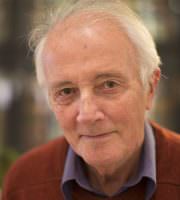by Peter Riley
Now she cracks hazelnuts on the floor
with a hammer and hands me the kernels
to eat, taste of wood. The town outside
is dark, people are at home. One or two
are bitter-sweet. Yes, some are good
and some are bad. There is music on the radio
by Orlando di Lasso also known as Lassus,
who once sat with William Byrd in a small boat
and they were rowed across the Thames at night.
And all of that is good.
Domini— exaudi
the cat seizes a nut and runs off with it
orationem meum
the pile of husks on the matting
is greater, at each entry
there is a purity, a goodness:
the generous gift given always calmly
that is my oratio, song and dance
counterpoint and harmony
we stayed up specially for this, it is
my dance tonight, my rhetorick to say
there is a purity which is a goodness
and the generous gift is calmly given
all the time, and I know that out of this
special place it is not given or calm
or good or bad but here it is so utterly
said and heard that it lives on.
The Mass is built on a popular song
which says "Since I have lost" and all the time
in all the specialness we can't omit to notice
that we have also lost, a phrase which is
never far away, tucked into the whole edifice
I am alone, I have lost, I am not what I seem;
indeed we have abandoned and lost so much to be
in this observance together the whole of the earth
and our good sleep, staying specially awake in case
a purity exists by which a gift is given not
necessarily to us but as a giving which exists and
we are forced to recognise against our loss
a constancy.
It is the material of this song, movement and time
breaking into the structure, symmetry encrusted
on stone, the whole theatre of what is set forth
"as if it were natural" reaching to an admission,
that it is ruined in time. The sculpture reverts
to the quarry face: we have lost, we have lost
so much by the time it weaves to an end
that we are hardly where we are and
have donated all our presence into a sung and
danced oratio which reaches its end. Over
the sea or Thames in some dark cave or quarry
is an inscription on a carved tomb
which says again that the utter gift is constant.
Post Scriptum: we have lost.
Appendix: J'ai perdu.
And the gift is of what, of what is,
the human being the person given
to the totality the commonality
given to the continuance over the air beyond
the person in a grand manner of perception,
and here also the enclosure of house, room,
group of two assuming ourselves into the future
by a child, so given entire with a clause in
small print: we also lose, we must, otherwise
these things made are of such
colossal beauty these masses tombs and
mutual percepts we might petrify on the spot,
we'd have nothing at all.
A particle, or seed, remains, "lost"
to the immediate city and
isn't this how we survive, how we survive
our own generosity and purity, isn't this
our mark of love?
Last updated July 20, 2021




